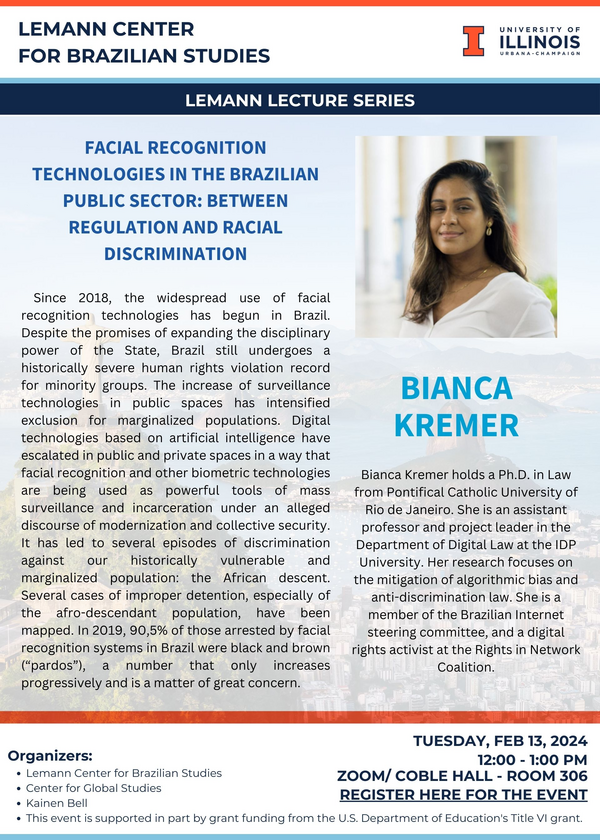
Lemann Lecture Series | Bianca Kremer | Facial Recognition Technologies in the Brazilian Public Sector: Between Regulation and Racial Discrimination
- Event Type
- Lecture
- Sponsor
- The Lemann Center for Brazilian Studies, Center for Global Studies-Global Intersections Grant, Kainen Bell
- Location
- Coble Hall 306
- Virtual
- Join online
- Date
- Feb 13, 2024 12:00 - 1:00 pm
- Speaker
- Bianca Kremer holds a Ph.D. in Law from Pontifical Catholic University of Rio de Janeiro. She is an assistant professor and project leader in the Department of Digital Law at the IDP University. Her research focuses on the mitigation of algorithmic bias and anti-discrimination law. She is a member of the Brazilian Internet steering committee, and a digital rights activist at the Rights in Network Coalition.
- Registration
- Register here for the event
- Contact
- Lemann Center
- lemann@illinois.edu
- Views
- 372
- Originating Calendar
- Lemann Center Events
Large public financial resources and investments in digital solutions have been developed in Brazil in the last 10 years in order to raise the standards of public services. One of the most expressive examples is the wide adoption of facial recognition technologies for public purposes, both in terms of identity authentication and public security. The history of facial recognition in Brazil is recent and dates back to major events that took place during the 2010s, when different technologies and surveillance architectures were experimented with for security purposes at events such as World Youth Day (2013), FIFA World Cup (2014) and the Olympics (2016). Those major events left Brazil a legacy of substantial fiscal crisis and a wave of violence at the end of the 2010s when Brazil reached a level of more than 60.000 violent deaths recorded. The common feeling of increased violence and insecurity were factors that the Brazilian extreme right made use of at the 2018 presidential elections, aligned with a punitive agenda and the violation of rights as public policy, especially for ethnic minorities. The victory of far-right candidate Jair Bolsonaro enhanced the elections of governors and parliamentarians aligned with these agendas in the following years. Some of these legislatures were marked by international trips to China to learn about and acquire surveillance technologies, especially facial recognition cameras for public security purposes. Rio de Janeiro and Salvador are some of its most expressive examples. Since 2018, the widespread use of facial recognition technologies has begun in Brazil. Despite the promises of expanding the disciplinary power of the State, Brazil still undergoes a historically severe human rights violation record for minority groups. The increase of surveillance technologies in public spaces has intensified exclusion for marginalized populations. Digital technologies based on artificial intelligence have escalated in public and private spaces in a way that facial recognition and other biometric technologies are being used as powerful tools of mass surveillance and incarceration under an alleged discourse of modernization and collective security. It has led to several episodes of discrimination against our historically vulnerable and marginalized population: the African descent. Several cases of improper detention, especially of the afro-descendant population, have been mapped. In 2019, 90,5% of those arrested by facial recognition systems in Brazil were black and brown (“pardos”), a number that only increases progressively and is a matter of great concern. Artificial intelligence systems have been presented by public authorities as an expressive solution for some of the oldest cyclical problems, such as poverty, educational gap and violence in Brazil. However, discrimination dynamics have been reproduced, reinforced, and hidden in surveillance policies and governmental programs.